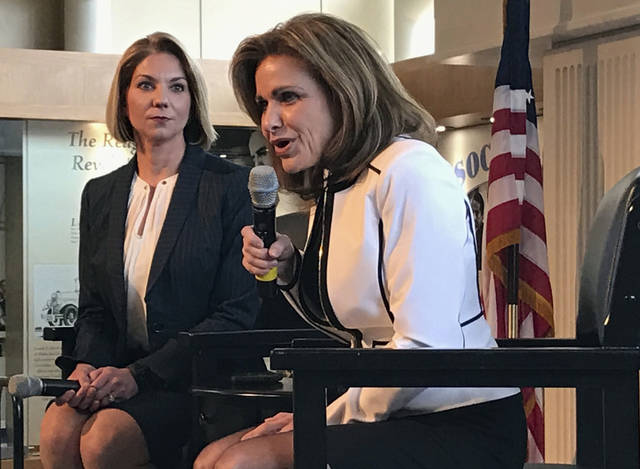Kansas Rep. Jenkins booed as she defends GOP health plan

ASSOCIATED PRESS
U.S. Rep. Lynn Jenkins, right, R-Kan., answers questions from the audience Monday, March 13, 2017, at the Robert J. Dole Institute of Politics on the University of Kansas campus in Lawrence, Kan. Sitting to her left is moderator Melissa Brunner, a news anchor for WIBW-TV in Topeka.
LAWRENCE, Kan. >> Republican Rep. Lynn Jenkins faced boos and shouts of “Do Your Job!” in defending a GOP plan for overhauling health care today during a raucous town hall meeting held the same day a congressional report said millions of Americans would lose insurance coverage.
Jenkins disputed the analysis of the nonpartisan Congressional Budget Office that 14 million Americans would lose their coverage in the next year if the plan drafted by top House Republicans were enacted. The five-term congresswoman also said the analysis doesn’t take into account a potential decrease in health costs from its changes.
But the audience of about 300 people was highly skeptical at the Robert J. Dole Institute of Politics on the University of Kansas campus. While the institute is named for the Republican icon and 1996 presidential nominee, Lawrence is perhaps the most liberal community in Jenkins’ eastern Kansas district.
“We’re not going to throw anybody off their health insurance,” Jenkins said as the crowd booed.
A few audience members shouted, “That’s not true!” Jenkins’ event was reminiscent of other rowdy meetings held recently by Republican lawmakers in several states.
They’re facing questions from Democrats about how replacing the Affordable Care Act championed by former President Barack Obama would affect people who obtained coverage through that 2010 law and states that expanded their Medicaid programs under it. But they’re also under pressure from conservatives who argue the House GOP plan preserves too much of the former president’s signature policy.
Don't miss out on what's happening!
Stay in touch with breaking news, as it happens, conveniently in your email inbox. It's FREE!
Jenkins said the House GOP plan would bring health care costs down by allowing people to use health savings accounts and shop around for the best price on their care.
“As premiums come down then that means that people will be able to afford health care,” Jenkins said.
She also said the Republican plan would help people who don’t qualify for subsidies to buy policies in the federal marketplace by giving them tax credits. The congressional analysis noted the current subsidies would end in 2020 and that the tax credits would be less generous overall.
Janella Williams, a 45-year-old Lawrence resident, said she was able to start her own business rather than staying at a “dead-end” job for the health benefits because of the 2010 federal law.
“There are a lot of us out there that our life and our quality of life depend on the ACA,” she said.
Republican Gov. Sam Brownback has been a vocal critic of “Obamacare” and the state hasn’t expanded its Medicaid program.
Brownback spokeswoman Melika Willoughby said part of the GOP plan setting a per-capita cap on federal spending on Medicaid in 2020 “best allows for state-based innovation.”
State officials did not immediately have an analysis of how the House GOP plan would affect the state’s Medicaid program or the nearly 100,000 Kansans residents enrolled this year in health coverage through the federal marketplace.
But Sheldon Weisgrau, executive director of the Health Reform Resource Project, an education and outreach initiative funded by several foundations, said the House GOP plan is likely to harm older residents of rural areas where coverage already is expensive.
“Kansas does seem to fit the picture of the kind of place where people will be harmed by this plan,” Weisgrau said.



